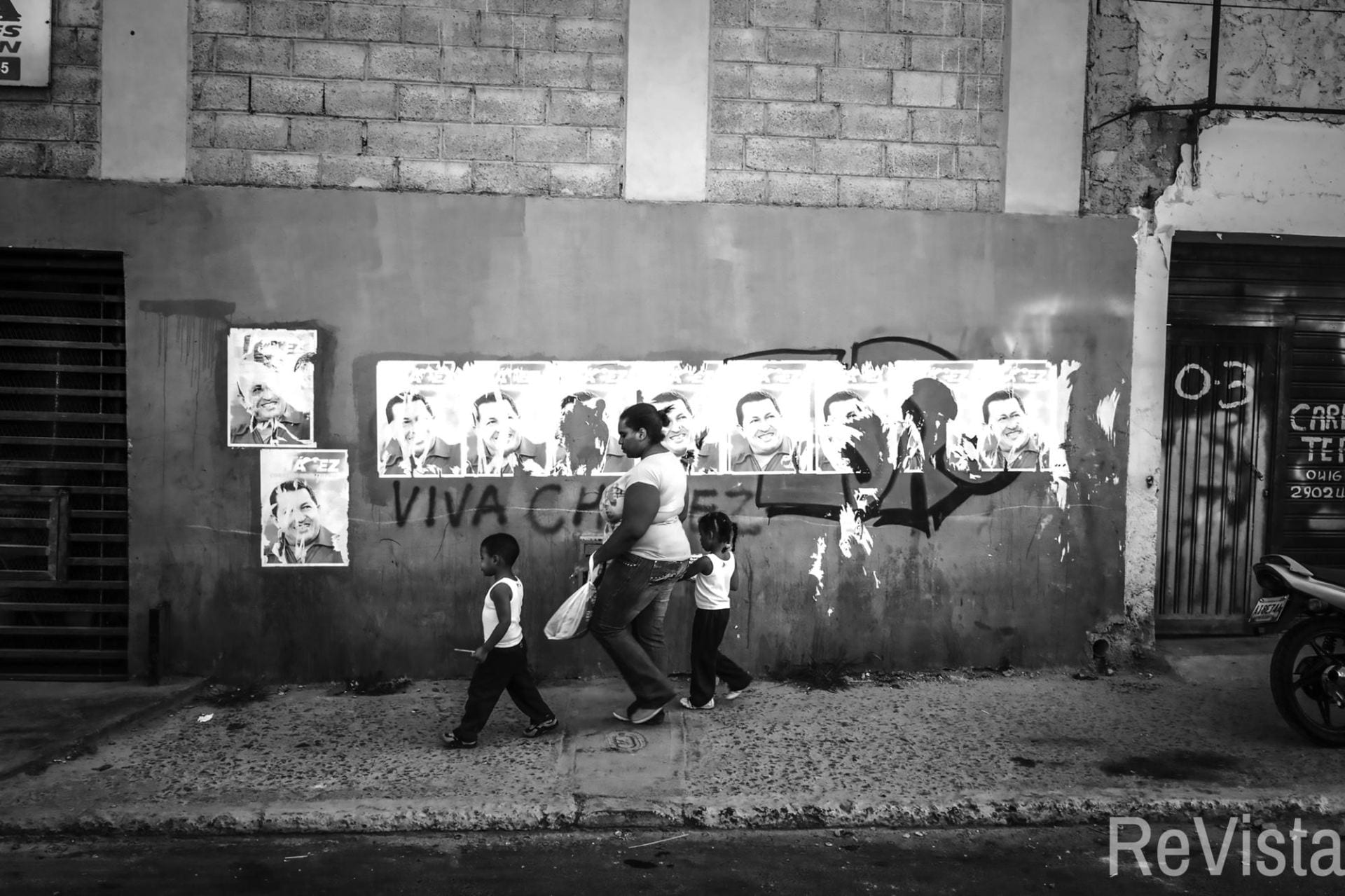China-Venezuela Relations
A Perfect Storm
In the spring of 2012 researchers from China’s biggest Latin America-focused think tank, the Beijing-based Institute of Latin American Studies (ILAS) at the Chinese Academy of Social Sciences, invited me to give a talk. ILAS hosts suggested they would be especially interested in hearing my thoughts on what Chinese researchers, businesses and policy makers should understand about political risk in Latin America. I found that choice of topic particularly intriguing given what I’d been hearing about rising anxiety about how political risks tied to the Arab Spring posed a challenge to China’s rising commercial interests in regions like Africa and the Middle East. It was just around the time of the ILAS invitation that I had become curious to understand more about China’s rapidly expanding oil, finance and diplomatic relationship with Venezuela’s Hugo Chávez. So even though the topic of Venezuelan political risk was new to me, I chose that as the focus for my presentation. I argued that across a number of dimensions, from rising social and political polarization to politicization and mismanagement of the oil sector to Chávez’s growing health concerns, Venezuela presented an array of formidable political risks—probably second to none in the Western Hemisphere, for any investor or lender, including China. The almost universal response from the ILAS participants was that even though they acknowledged the worrying trends in Venezuela, ultimately China’s economic and diplomatic interests there would not be adversely affected since, after all, Venezuela had a lot of oil and China needed a lot of oil and besides, had a lot of money to pay for it.
Fast forward over six years and the question of how China should understand and manage political risk in Venezuela has become one of the most important, if too often ignored, questions not just in China’s relationship with Latin America, but in its broader efforts to be seen as an agent and leader of development on the world stage. This relationship of superlatives (Venezuela has the world’s largest oil reserves, China is the world’s largest oil importer, China has lent more money to Venezuela than any other country in the world, etc.) and larger-than-life personalities (at least on the Venezuelan side) has long since become a debacle. And while Venezuela’s deepening economic and humanitarian crisis has attracted global headlines and concern, China has neither acknowledged its role and interests in Venezuela’s crisis nor sought to address the plight of the closest country it has to an ally in the Americas.
How did this dysfunctional relationship come about and what does it tell us about China’s ties with Latin America and its even more high-profile efforts at global development and South-South leadership?
A PERFECT STORM
On its surface, the China-Venezuela relationship fits into the broader pattern of raw materials-based trade, investment and financial ties between China and South America in the first decade or so of the 21st century. The China-led commodity boom from around 2003-2013 ushered in massive new trade flows of agricultural (soy), mining (copper and iron ore) and energy (oil) commodities from South America to China, which rapidly became the number one trade partner for countries like Brazil, Chile and Peru. Venezuela, with the world’s largest petroleum reserves, was thus seemingly a perfect partner for China, which is today the world’s largest crude oil importer. Even as Venezuela has descended into crisis, China has at least officially continued to emphasize the natural “complementarity” of the relationship as a kind of stabilizing ballast amidst the storm. Yet from the beginning, the China-Venezuela relationship has stood out among all of China’s ties to commodity-rich countries, not just in South America but globally. Venezuela’s former larger-than-life leader, Hugo Chávez, and what Henry Sanderson and Michael Forsythe have dubbed China’s “superbank,” the China Development Bank (CDB), together created a loans-for-oil and diplomatic partnership that was intended to showcase the possibilities of the type of South-South cooperation ushered in by China’s emergence as a global actor, but that instead serves as a cautionary tale of hubris and unintended consequences.
On the Venezuelan side, Chávez saw China as a crucial partner in his efforts to use control of the nation’s abundant petroleum supplies to implement his radical domestic and foreign policy agendas. Not only did expanded exports of petroleum to China fit into Chávez’s rhetoric of diversifying away from export dependence on the United States, but massive loans-for-oil deals with the CDB (to the tune of $40 billion prior to his death in 2013) provided a steady supply of economically and politically fungible funds that no other international creditors would or could provide. In addition, by emphasizing China’s socialist and revolutionary bona fides (as faded or imagined as they may be), Chávez also found China to be a convenient, if often reticent, partner in his Bolivarian Revolutionary agenda at home and abroad.
On the Chinese side, what may initially have been another largely practical trade and investment relationship with a commodity-rich South American country soon turned into something quite bigger and different. Instead of just buying Venezuelan oil as India has done, China’s state-owned CDB set up a series of multi-billion dollar loans-for-oil deals. At the time and still today, these loans constituted China’s largest outlay of finance to any other country not just in Latin America but globally, and quickly made China Venezuela’s largest source of sovereign finance. Part of what explains the CDB’s eagerness to lend to Venezuela in these years was that the bank, under the leadership of its seemingly untouchable president and Chinese Communist Party scion, Chen Yuan, was looking to establish its credentials as China’s principal financier of global energy deals. It was also no mere coincidence that around the time of the largest loans, including one for $20 billion in 2010, that massive new sources of liquidity were sloshing around the Chinese financial system in the wake of Beijing’s response to the global financial crisis.
Thus Chávez and the CDB convinced themselves that theirs was an economically and politically astute and viable partnership. Yet by the time I gave my talk at ILAS in 2012, a growing sense of unease about Venezuela was spreading in Beijing, including concerns about Hugo Chávez’s ill health. By the summer of 2014, Chávez had died and been replaced by a leader in whom China had far less confidence, and the global price of oil had plunged. The Venezuela political, economic and humanitarian crisis that has followed has not only been a disaster for the people of Venezuela, but it has also undermined every element of China’s interest in the relationship. The near complete meltdown in Venezuela’s oil production has meant that its government has been unable to service the original terms of the loans, which eventually came to total more than $60 billion, including not just a form of de facto default but also lower-than-agreed oil shipments to China. Probably more consequential, however, is that
Venezuela’s oil production crisis has contributed to a rise in global oil prices over the last year, raising China’s total oil import bill. From almost every possible angle, then, the China-Venezuela relationship has become completely dysfunctional for the governments, businesses and citizens of both countries.
BROADER LESSONS
Unsurprisingly, neither the Chinese nor Venezuelan authorities publicly acknowledge that their relationship has failed to live up to the high expectations their leaders had set well over a decade ago. To be sure, China has dramatically scaled back the scope of its lending in recent years, but at each new sign of Venezuela’s further descent into crisis, Chinese foreign policy leaders simply make formulaic statements about their hopes for “stability” in Venezuela. Yet China has refused to play any public role in Latin American regional efforts, such as through the Lima Group, to help Venezuela find a more sustainable path forward. In short, China has chosen to wash its hands of its role in first facilitating, and then failing to help resolve, Venezuela’s crisis.
Beyond just the details of what has gone wrong in their one-on-one relationship, China-Venezuela ties have broader, if too often underappreciated, implications in a number of ways. In view of that discussion I had with the ILAS researchers back in 2012, it is clear that Venezuela was and remains an important test case for how Chinese researchers as well as government and business officials understand, or misunderstand, political risk in Latin America and beyond. There was a strong belief in China that complementary oil-based linkages, grounded in seemingly unshakeable ties between Venezuela’s paramount leader and one of China’s state-banking champions, could not be derailed. There was further belief that through its loans-for-oil deals, China would both guarantee oil flows and loan repayments while remaining immune from any vicissitudes of Venezuelan economics or politics.
All of these assumptions have been upended in Venezuela, yet China has made similar calculations in its lending and investment relations with other resource-rich developing countries not just in Latin America but also in Africa and Asia. To be sure, it’s hard to find another equivalent of Chávez’s Venezuela in Latin America, but Mugabe’s Zimbabwe or Hun Sen’s Cambodia offer analogues in China’s Africa and Southeast Asian relationships. Moreover, the massive debt-based relationship that China built up with Venezuela is a warning sign for debtor and lender alike as China seeks to lend and invest hundreds of billions of dollars through its global Belt and Road infrastructure plan.
FINAL THOUGHTS
In the more than six years since that original ILAS presentation, I have been writing, speaking and teaching about the slow- motion train wreck that is China-Venezuela relations. I have done so not out of a sense of schadenfreude; certainly the United States has made bigger mistakes in Latin America and elsewhere, but out of a sense that something could and should be changed. For example, as a country that is working to improve climate governance both at home and abroad, China could engage with Venezuela to think of innovative ways to develop the country’s oil resources in a sustainable way. Or, given China’s growing role as an important energy and infrastructure lender in Latin America and globally, an honest and open reckoning with China’s experience in Venezuela could serve to avoid similar mistakes down the road.
One final thought stays with me as I reflect on these years of researching and writing about China and Venezuela. It is that for most of that time I was a professor in a Chinese university (I left Tsinghua University last summer), and even though in every publication and every classroom and public presentation I gave what I viewed as a constructively critical view, I was never once directly or indirectly dissuaded from such a stance. In fact, quite the opposite was true as I was frequently invited for media interviews, think tank conferences and business confabs where it was clear that I would voice my concerns about the direction of China-Venezuela ties or of China-Latin America relations in general. All that may come as a surprise given the well-deserved
reputation China has gained for sensitivity to criticism of its foreign policy or for the lack of intellectual freedom in Chinese academic institutions.
They listened politely, but I wish China’s foreign policy and bank officials would heed my calls for a more sensitive and empathetic approach to their foreign policy toward Latin America and other developing country regions, one that does not threaten to unnecessarily repeat the past mistakes of other global powers.
Fall 2018, Volume XVIII, Number 1
Matt Ferchen is a nonresident scholar at the Carnegie-Tsinghua Center for Global Policy, where he runs the China and the Developing World Program. From 2008-2017 he was a faculty member in the Department of International Relations at Tsinghua University where he taught courses on Chinese political economy and China-Latin America relations. In 1997 he completed the China and Latin American Studies programs at Johns Hopkins SAIS for his Master’s degree and went on to get a Ph.D. in Government at Cornell before joining Tsinghua and Carnegie-Tsinghua.
Related Articles
From Vendedor to Fashion Designer
English + Español
Korean immigrants in Latin America are shaping and developing fashion economies there. Upon arrival, Korean immigrants to Argentina and Brazil may have been lonely, isolated and confused…
Shared Sentiments Inspire New Cultural Centers
English + Español
In the early afternoon of January 3, 2018, in the mountainous village of Shicang, Zhejiang Province, China, firecrackers burst into the air and flags waved in the wind as a parade of Clan…
Evidence for Hope: Making Human Rights Work in the 21st Century
A Review of Evidence for Hope: Making Human Rights Work in the 21st Century Contemporary Human Rights and Latin America On September 5, 1921, Roscoe “Fatty” Arbuckle, Hollywood’s then best-paid star, attended a party in San Francisco’s St. Francis Hotel, drank...







